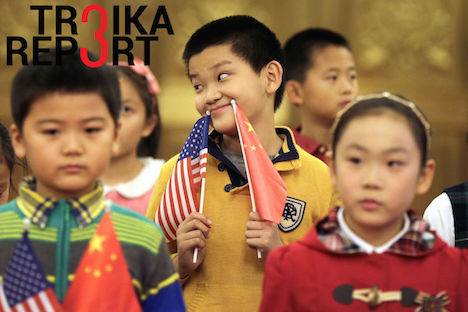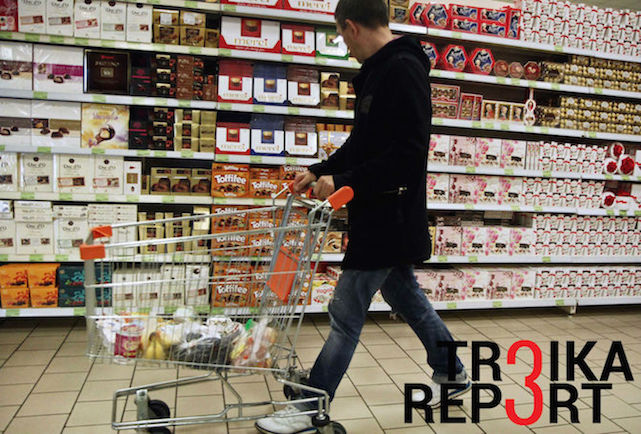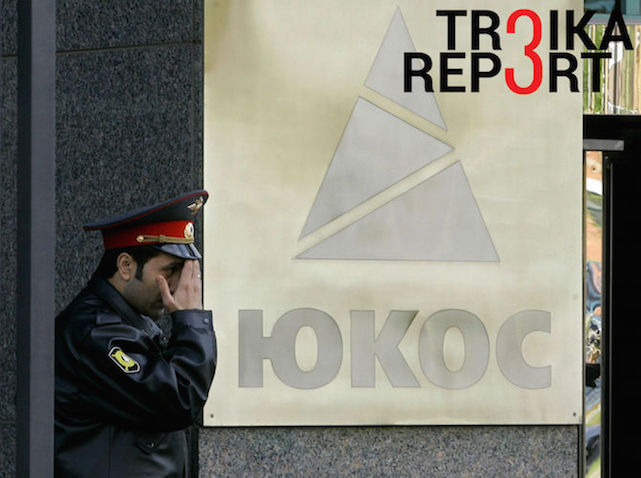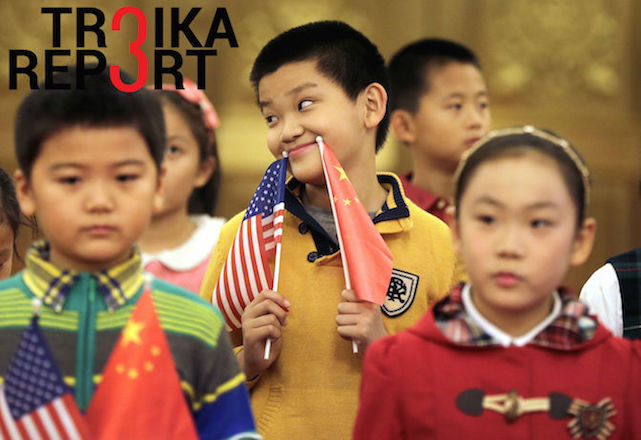

The embargo has deprived the Russian market of a significant portion of imported products. Source: AFP/East news
The decision of EU foreign ministers to extend sanctions against Russia until January 2016, which was largely expected following the impasse in negotiations on resolving the conflict in eastern Ukraine, leaves Brussels and Moscow at another crossroads.
The next six months will come as a crucial test for their relations. It will determine whether there is still room for a constructive dialogue or whether the two sides will then consider a total disengagement.
The lifting of Western sanctions is conditional on the settlement of the conflict in eastern Ukraine. The six-month extension by the EU, according to The Wall Street Journal, is a move which will give the bloc time to gauge if the Kremlin will implement the Minsk ceasefire plan. Given the current abysmal state of affairs, with both sides breaching the ceasefire, Troika Report does not see the prospects of a dignified and smooth end to the war of sanctions as especially bright.
This opinion is largely shared by Sergei Utkin, head of the department of strategic assessment and situation analysis at the Russian Academy of Sciences, who made the following comment for Troika Report:
“There is the same stalemate as before. We see efforts to ensure that the process of conflict resolution is going forward. But the results are not yet there. Some people argue that the war of sanctions should be ended. There are reasons for that. Both the EU and Russia are experiencing economic difficulties. However, the people who took the decision to introduce sanctions in the first place cannot admit that these measures were in vain and useless. They insist that such a policy could bring results but it needs more time. This is their rationale for extending sanctions.
“Yet there is no major deterioration on the ground. So, there are no grounds to strengthen the sanctions. They are trying to find a common denominator, to draw a middle line between the countries which favor hardening the pressure on Russia and the others that suggest easing the sanctions.”
— The St. Petersburg Economic Forum showed signs of weariness on the part of business. Could we expect the lifting of sanctions when the current six months expire?
“We can expect that but it will depend on the developments in the conflict area in Ukraine. If we manage to ensure that the Minsk agreements work, and the warring parties go from open warfare to a political dialogue, then, I believe, we can expect the end of the sanctions. Today, on the contrary, we are seeing an escalation of hostilities, and the EU will not ignore it, even if lobbied by European business.”
For the moment, the EU is divided into two camps, with the proponents of a hard-line policy arguing that Western sanctions have inflicted significant damage on Russia’s high-tech sector, as well as its banking and defense industries, and that the blockade, if prolonged, will ultimately cripple the Russian economy and force Moscow to capitulate.
Their opponents claim the effect of sanctions has been limited, produced no changes in Russia’s foreign policy — with the exception of its pivot to Asia, and re-created division lines in Europe that hurt its long-term perspectives of stability and prosperity. Irrespective of dissident voices, the EU is taking a united stance on dealing with Russia. For that reason, the chances of the sanctions being canceled are rather slim.
The demand that Moscow reject the referendum in Crimea and forcibly return it to Ukraine is not attached as a precondition to the normalization of relations with Russia. However, the issue could crop up at any time in the future, and, subsequently ruin any attempts of rapprochement.
Troika Report notes that the war of sanctions and counter-sanctions has taken its toll on both sides and assumes that the European Union can afford to pursue a two-track policy. Meaning, while not abandoning sanctions altogether, the EU member states would be unofficially allowed to continue maintaining and even developing trade and investment interaction with their Russian counterparts. For the moment, however, it all looks like wishful thinking.

In this archive photo a policeman guards headquarters of Russian oil gaint Yukos in Moscow, Thursday, May 10, 2007. Source: AP
Russia’s relations with the West, handicapped by the ongoing war of sanctions, hit another new low last week following the decisions of arbitration courts in Belgium and France to freeze Russian state assets over the case of the now-defunct oil company Yukos.
What most see as nothing more than a purely legal move to protect Western shareholders’ rights has created a bitter struggle which may trigger debate on the do’s and don’ts in relations between business and state. It also invites scrutiny of the role of “justice without borders” in international relations.
Russia’s angry reaction indicates that the chances of a tit-for-tat response from Moscow are pretty high, despite the risk of aggravating tensions between the West and Russia even further. Some claim the confrontation is spiraling out of control. In the meantime, Russian and foreign experts, interviewed by Troika Report, are split on the follow-up scenarios, indicating no one can predict the scale of the boomerang effect and how far the current “war of asset arrests” may evolve.
This is how the story goes. Last July, the Permanent Court of Arbitration in The Hague upheld the lawsuit by Group Menatep Limited (GML), representing former shareholders of the now-defunct oil company Yukos, which was broken apart following the arrest of its CEO, Kremlin critic Mikhail Khodorkovsky, in 2003 on tax evasion charges widely seen as politicized. The court based its ruling on assumption that Yukos was deliberately made bankrupt and later nationalized. The ruling stipulated that Russia must pay $50 billion to the company’s shareholders for expropriating the assets of Yukos. Moscow has so far refused to pay.
Now, local courts in Belgium and France have launched a freeze of Russian state assets worth 1.6 billion euros, which could last for years, with an apparent intention to up the stakes and force Moscow to compensate the Yukos shareholders in full.
What are the legal grounds for it? Will Moscow retaliate? Prominent political analyst and public figure Sergei Stankevich, senior expert with the Anatoly Sobchak Foundation, shared his comments with Troika Report on the latest episode in the downward spiral of relations between Russia and the West:
“The Hague court decision in the Yukos vs. Russia case is seen in Moscow as unjustified and politicized. I believe that Russia will be able to challenge this decision. The court did not have the right to handle the case.”
—What could be Russia’s line of defense?
“The most important thing is not to be involved in a “war of asset arrests,” which could only increase tension. Russia should take only legal actions and use to the full the principle of “rule of law” accepted in Europe.”
— Is it a coincidence that the seizure of assets took place almost at the same time as the decision of the European Union to prolong sanctions against Russia for another six months?
“I don’t think these two actions are interconnected. The move by the EU to extend sanctions was quite predictable. The EU simply confirmed the status quo.”
However, Sergei Stankevich’s claim that the decision was “politicized” is contradicted by Roslyn Fuller, an Irish expert in European law. Here is what she had to say to Troika Report:
“This is not really an anti-Russian decision. It is a pro-business decision. The courts aren't really corrupt – more just the willing handmaidens of the system.
“The arbitration panel specifically mentioned Khodorkovsky in the decision. He is the darling of Western establishment because he is the kind of guy they want to do business with. The arbitration panel accepted this extremely widespread opinion of Khodorkovsky — the European Court of Human Rights did not.”
What now? Some local lawyers believe Moscow might opt to pay off the 1.6-billion-euro sum to save the rest. Others advise against this move since it would immediately create a precedent and make Moscow liable to pay the entire sum, that is $50 billion.
The original arbitration ruling was rooted in the provisions of the European Energy Charter Treaty, which Russia signed in 1994 but never ratified. As Roslyn Fuller remarked in conversation with Troika Report, “a similar case went through the European Court of Human Rights – it had pretty different findings and way lower, more fair compensation. Russia made some fairly good arguments about whether these investors, which were registered through shell companies, could be protected under the investment treaty.”
No less relevant is the fact that Yukos emerged as one of the country’s largest oil producers during the Boris Yeltsin era after Mikhail Khodorkovsky obtained control of the best assets of the Soviet state-owned oil industry, becoming the richest man in Russia overnight. Questions remain about how exactly these assets came into Khodorkovsky’s hands, though to be fair, Yukos was far from the only case in which huge chunks of state property were acquired by selected individuals under shady privatization schemes, and the Kremlin has turned a blind eye to the involvement of many of Khodorkovsky’s peers in such deals.
The triumph of Yeltsin’s “robber barons” back in the 1990s now adds a touch of bitterness to the current political turmoil. For now, it remains unclear who will come out on top in the legal struggle initiated by the former shareholders of Yukos.

Chinese children arrive for a rehearsal for a welcome ceremony for visiting U.S. President Barack Obama at the Great Hall of the People in Beijing Wednesday, Nov. 12, 2014. Source: AP
After a heated debate on Capitol Hill, U.S. President Barack Obama this week managed to convince the House of Representatives to vote for his “fast-track” authority in forging the 12-nation Trans-Pacific Partnership (TPP). But it could still face stiff resistance in the Senate. Moscow is watching the debates over the initiative closely, since it could create a trading bloc harmful to Russia’s new eastern strategy, often referred to as a “pivot to Asia.”
The U.S. administration is keen to focus on Asia and the Pacific in order to reap the benefits of the fastest growing region in the world. Moreover, the very concept of the Trans-Pacific Partnership envisages the U.S. as the rule setter, as the supreme authority to shape benchmarks in trade, financial services and banking, labor laws, environment norms, intellectual property regulations, etc. Essentially, the TPP is about introducing American economic and social standards to a whole region.
However, this attempt by the U.S. to widen its Asian foothold and forge a trade alliance with an almost inevitable political agenda sends a warning signal to China.
How will the United States’ exclusion policy resonate with Beijing and, subsequently with its ally, Moscow? Alexander Lomanov, head research fellow of the Institute of Far-Eastern Economic Studies at the Russian Academy of Sciences, provided his answer to this crucial question to Troika Report:
“It’s quite evident that no comprehensive partnership is possible in the Asia-Pacific region without China. The current version of the Trans-Pacific Partnership excludes China. The greatest problem is not whether or not Obama will be able to push the Trans-Pacific Partnership through Congress, but whether his administration is willing to find a compromise with China and integrate it into the bloc. Otherwise, the suspicions of Beijing will be justified, and the Trans-Pacific Partnership will be regarded as an alliance aimed to contain China and harm its economic development.
“We can see only two options. One is that America and China are preparing for the visit by Chairman Xi Jinping to the United States in September, and planning new deals and even hoping for a breakthrough. The latter might amount to the adjustment of the rules of engagement in the Trans-Pacific Partnership. For the moment, these rules are too stringent for China. The social, ecological and technological standards established by the TPP are not acceptable for China for the moment. But if the U.S. offers China a transitional status for some 15 years, to allow it to accommodate the TPP’s standards and norms, then the bloc would be an alliance not against China but with China. It would change then not only world trade and economics but global politics as well.”
The second option, which is more likely, is that the Trans-Pacific Partnershipwill remain basically an anti-Chinese alliance. In this case, China will position itself as the center of a new economic bloc.”
— Where is Russia’s place in this battle between the U.S. and China over the allegiance of the Asia-Pacific nations?
“China will respond to the Trans-Pacific Partnershipby building up a trade and economic alliance, incorporating, for instance, the Association of Southeast Asian Nations member states, and in the wake of Beijing’s initiative, nations of the Silk Road Economic Belt, which include the Central Asian republics and Russia. It will also mean that once China is left out of the TPP, Beijing will build its own alliance and enhance cooperation with the Russia-led Eurasian Economic Union.”
“The realities on the ground show that Russia will not join the United States or the European Union in any kind of an anti-China alliance. This would mean Russia confining itself to total isolation. Under the circumstances, Russia will focus on strengthening relations with China in the next 5-10 years.”
“Of course, Russia is not ready for a full-scale free trade agreement with China right now, but after a transitional period, possibly 20 years, a free trade zone is feasible, provided it will also include post-Soviet states and South-East Asian nations.”
For the moment, Obama is facing an uphill battle with his Trans-Pacific Partnership project, with the final outcome remaining unclear. Even some of his staunchest party supporters have turned against him, for instance, Nancy Pelosi, former Speaker of the House, who claimed the TPP was “against workers' rights,” and even Hillary Clinton, the possible next U.S. president, who chose to distance herself from the embattled Obama.
On the global side, the race to compiling regional trade blocs is gaining momentum. Russia feels unwelcomed by the Anglo-Saxon-led blocs, and consequently will seek to spearhead its own community, the Eurasian Economic Union, and secure a privileged place in the China-led and China-initiated alliances.
The opinion of the writer may not necessarily reflect the position of RBTH or its staff.
All rights reserved by Rossiyskaya Gazeta.
Subscribe
to our newsletter!
Get the week's best stories straight to your inbox